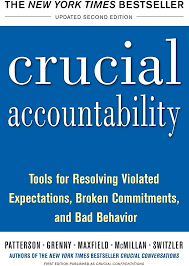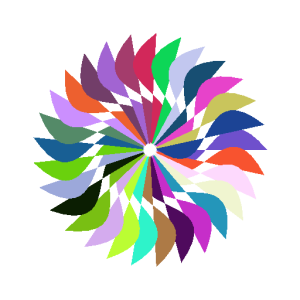For my work with Right to Be this summer, I am creating a self-accountability training. What is self-accountability training, you may ask? It is an instruction and exercise on how to deal with your innate biases and hold yourself accountable when you act on them. Because of this, I have been doing a lot of readings on accountability. Now, accountability as a whole is very complex and spanning. And while I have not read a ton on self-accountability, reading about how to hold others accountable has got me thinking a lot about my own life.
To prepare for my task at hand, I was given a book entitled Crucial Accountability: Tools for Resolving Violated Expectations, Broken Commitments, and Bad Behavior. The book is broken into 3 parts: one about working on yourself, one about creating safety in conversation, and a final one about putting this all into action. By breaking it into these three parts, it is easy to grasp the topics and see the flow of ideas and building of momentum and confidence. The chapters in each section seem manageable, allowing the reader not to be overwhelmed with all the tasks and skills that need to be established. The separation also facilitates a learning arc where the reader is able to recognize the issues in their own lives and begin to work towards what they truly wish. I have documented my own journey in this blog.
I have always been one who struggles in the face of conflict, both in just being in it and being the one who initiates something that may lead to conflict. Because of the latter, I often do not try to hold others accountable as I fear their reactions. This was something I was loosely aware of; however, in reading Crucial Accountability, I came to realize how many of my actions resulted from this lack of holding people accountable. They talk about “exploding” or lashing out when it builds to a point where your silence has created so much resentment that you cannot hold it any longer. And as much as I do not want to admit it, I have had those moments of explosion and still hold a lot of resentment towards people and groups that I did not hold accountable.
This creates an interesting situation as it turns a lot of these feelings back onto myself. I begin to blame myself for lashing out and removing the blame from those whose actions caused the feelings. I am not sure where the balance of these feelings falls, or even how to find that balance. It is also difficult as I think I consider some of my “lashing out” to be instances where I did hold someone accountable, but because that is so out of character for me, it feels like lashing out. And there are a lot of what-ifs. What if I had held them accountable for their actions the first time? Would it have led to a better relationship? Would it have stopped them before it got to the point that I had to report them? I do not have any answers to these questions.
Something stressed in Crucial Accountability is the idea that you need to ensure that the other person feels safe.
This, to me, was the biggest takeaway from the book as it defuses what leads to conflict before it starts. This tool, for some reason, makes me feel more empowered to hold others more accountable. However, I am not sure if that is enough to start holding people accountable for things that I have long let slide. For new things, yes, but for the old ones, the ones that have been built, I fear that it will look like the claims are coming out of nowhere.
But, it needs to be done, or at least that is what I keep telling myself. I cannot let others’ actions that bother me and affect me continue to grow as it makes my life miserable as I live in resentment. It gives them too much power that I want back. I do not want to live in resentment and anger due to other people’s actions. And even if they do not change, maybe it is a sign to remove them from my life instead of fighting this silent battle all the time. That is a scary thing too, but it is less scary than feeling as if I am a ticking time bomb ready to explode at any moment on them.
This is my year to reclaim things I have lost to these people. To reclaim the activities that they stole joy from, to reclaim the joy, to reclaim my life. This is my promise to myself.


